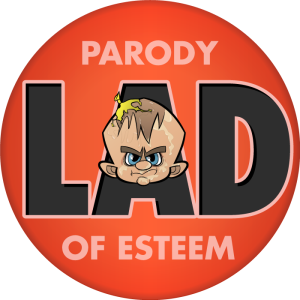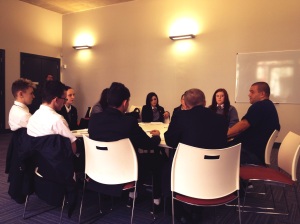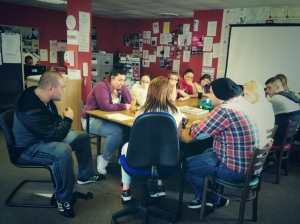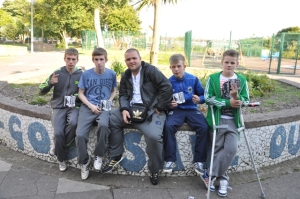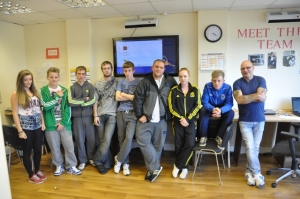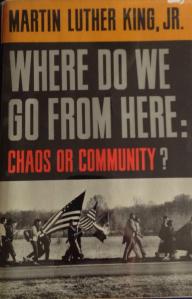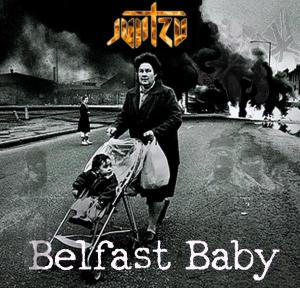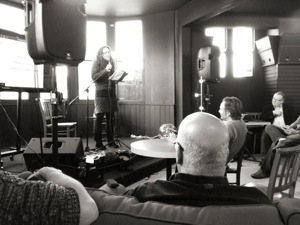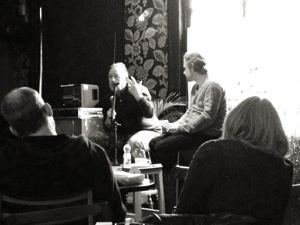Part 2 continues with responses that I received from people who wished to comment on the Loyalist Against Democracy website.
From a male church leader with a long history of involvement in peacebuilding:
‘I’m not a huge fan of the site though I have dipped in and out from time to time. I suppose my main problem with it is the same problem I had when the church made statements condemning violence (in either camp) but there was little going on on the ground to change things. The megaphone approach of condemnation or satire by middle class Christians or secular-humanists, unmatched by a willingness to get hands dirty and change hearts and minds is ultimately self-defeating… driving those you pontificate about further into a corner… Especially when LAD has turned its ire on those like John Kyle, who are trying to make a difference. This only serves in fulfilling the paranoia of those who claim to be on the margins already by forcing them further out of “respectable” society. My other problem with it as a satire site is that a lot of it just isn’t funny… That said, the campaign against the facebook site by those within loyalism, be it the repeated claims of harassment getting it banned, or the denigration of it as “Republican” is further proof that large swathes of loyalism are not interested in democracy or free speech, but only in hearing their own perspectives and prejudices repeated… But then they have learned that trick from established unionism with it’s constant criticism of the “liberal” BBC because it shines a light on the poor behaviour of the PUL community… The BBC (and media in general) doesn’t need to do any investigative journalism to uncover the shadowside of the PUL community – we parade it for the world to see… putting it on facebook and youtube… Yet when the BBC or LAD or anyone else draws attention to it then there is a loud cry of foul republican plot… If the PUL community put its own house in order then LAD would be out of business and the BBC would only be reporting the misdemeanours of republicans…’
From a female writer involved in education:
‘I suppose I would start by saying that if they are serious about challenging sectarianism then the way to go about it probably isn’t to only have a go at one side of the community. But aside from that…
The PUL people (who also actually count as ‘the people’ despite the fact that LAD seem to think they represent, er, everyone) may not have legitimate fears but they are certainly real fears, and those fears won’t dissipate through ridicule. I am angry at the flag protestors too. I’m angry that they have harmed their own community so much. The LAD group wants to suggest that they’re only having a go at flag protesters but their page is full of nasty comments about working class PUL in general. Last Christmas I sat and listened to a taxi driver in East Belfast who said he felt suicidal because he’d lost so much business. Those were his people on the street- very possibly people that he agreed with ideologically- and they were crippling him. So when everyone gets lumped in together they include him, and they include the bus driver who, that same evening, had his bus bricked as [my partner and I] sat at the back (the brick bounced off the window but the window completely shattered). He was really rattled, and he had to continue his round.
LAD like to make fun of people for poor grammar and spelling, they like to suggest that working class PUL people are thick. I say, if they’re so clever then why are they spending their days on photoshop making crap jokes? If they’re concerned about sectarianism then perhaps they should be championing those people doing community work is difficult areas. Low literacy isn’t a joke, neither are the suicide rates in East Belfast. There are plenty of working class PUL people spending *their* days trying to keep kids off the streets and trying to sort this shit out.’
From an elected PUL male politician:
“LAD was apparently born out the flag protests and quoting them “L.A.D. is a cross-community, non-political group set up to combat the growing tide of sectarianism in Northern Ireland through the use of satire” in effect they have evolved to be an instrument which mainly parodies some within the PUL community. Yes they undoubtedly highlight sectarianism but do seem to ignore other types of sectarianism from within republicanism for example. At times I find myself occasionally agreeing with them when they highlight the unelected ‘leaders of on the ground loyalism’ doing or saying simply stupid things, in fact things that I would imagine would embarrass many Unionists and Loyalists.
I’ve read comments on Facebook from a very unrepresentative section of the PUL community [LAD has then highlighted] which is appalling, sheer hatred of the RC community which has no place in our society. But I would feel confident that similar stuff is written on Facebook about ‘Pradisans’ but LAD choose to ignore it. Perhaps their core readership wouldn’t find it so funny?
One final issue that I would have is how funny does LAD think it is to highlight some within the PUL community who have difficulty spelling? How is that tackling sectarianism? Rather it is simply making light of an issue of educational under achievement which should be addressed but this is certainly not the way to do it. Is LAD then achieving its core aim? Not by my standards.”
From a male community development worker in a Loyalist area:
‘Mmmmm. It’s a bit of a guilty pleasure…I laugh, but I know I shouldn’t. The ludicrousness of loyalist incompetence is vying with genuine compassion for a struggling community. But I’m also aware that there is a darkness to loyalist culture that needs to be exposed and satire is a critical tool in exposing it. So I welcome the satire, though is it just me that detects that whilst in the early days there was genuine comedy in it, in recent weeks a really nasty streak seems to be emerging in the material.
Wonder too whether is is possible to be satirical about republican culture. Maybe I’m just not aware of where it’s happening.’
Male community development worker and peace worker:
If I’m honest, I’ve laughed out loud at some LAD posts and sworn out loud at others. LAD is a sign of the times we live in, lacking depth or accountability. It’s own haste trips itself up and is reactive which is always easier than creative. I find it cruel yet I laugh so what does that make me?
It’s unwillingness to engage face to face is worrying but not untypical of Norn Iron.’
This is more what I was trying to say:
‘It is easier to be against something than for something. And yet, it is much more gratifying to create than to destroy.’ – Miroslav Volf
A final thought from a very experienced community relations worker:
Step back. Point. Laugh. Call it satire. Call it whatever you like (and “satire” can cover a multitude of sins) but when it starts and stops there then in the final analysis its falls far short of any constructive address of Loyalism’s often genuine short-comings. In the final analysis it is very little real use to anyone. It’s easy though (far easier than a genuine involvement) and will get you attention if there are a few laughs to be had (and yes I have laughed at some of their material).
At this point I should also declare my own bigotry. I am from protestant working class unionist stock. Truth be told i jettisoned my unionism many years ago so LAD’s material doesn’t offend my pretty much non- existent Unionism/Loyalism. However when it openly declares its middle class credentials and castigates and ridicules entire working class communities then my working class bigotry can get a quick re-visit. So who am I to talk eh?

